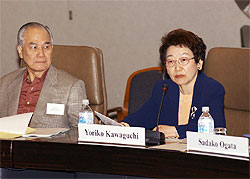(As Delivered)
Remarks by Foreign Minister Yoriko Kawaguchi
On the Occasion of Kyoto Meeting
on Threats, Challenges and Change

Good morning,
Excellencies,
Distinguished guests,
Ladies and Gentlemen,
It is my great pleasure to welcome distinguished members of the High-Level Panel as well as other eminent persons with excellent expertise in their fields, and to host "Kyoto Meeting on Threats, Challenges and Change."
Kyoto, as you know, has flourished for as long as 1200 years as the former capital of Japan. As many of you are fully aware, Kyoto symbolizes history and culture of Japan. At the same time, Kyoto has aptly kept up with the times, with a large number of cutting edge companies being born today in this city. Meeting the need of the times, maintaining what to be maintained, and reforming what to be reformed; this is exactly the mission of the High-Level Panel.
Japan is convinced that, in order for the United Nations to effectively deal with the threats the world faces, reform of the United Nations itself is indispensable. Also in Japan, the expectation towards the role of the United Nations in coping with new threats is mounting. Last autumn, I established the Japan's Eminent Person's Group on UN Reform, which was tasked to give me proposals on how the UN should be reformed in order for the organization to meet the challenges, and how Japan should play its part in that endeavor. The members of this group, who are Japanese dignitaries from various fields, and some of whom are here today, went through numerous discussions and produced a report. I would like to share it with you for your reference. Also, the Government of Japan is presenting its paper to your High-Level Panel, focusing on such areas as "peace consolidation" process in the post-conflict stage and the recent trend of legislative role of the Security Council. Japan believes that there is an urgent need for the UN institutional reform. I hope that this report and the paper will serve for Panel's future discussions.
The United Nations is faced with various challenges, not only inter state conflicts which are assumed in the UN Charter, but also internal violence, poverty, infectious diseases, terrorism, proliferation of weapons of mass destruction, and consolidation of peace. There is no doubt that each and every item is important, but time is limited. In this Meeting, I would like you to have a candid discussion focusing on how the international community and UN should tackle the issues of terrorism and proliferation of weapons of mass destruction, and what the agenda is for the peace- and nation-building in the post-conflict process.
Japan has been playing its part to contribute to the peace- and nation-building process. In Africa, Japan has been promoting TICAD (Tokyo International Conference on African Development) process to support the efforts for development by the Africans themselves. We have dispatched our Self-Defense Forces to East Timor and Iraq for humanitarian and reconstruction activities. In Afghanistan as well, with a significant cooperation from Ms. Sadako Ogata, President of JICA, Japan has made considerable contributions to the consolidation of peace.
It is vitally important for all of us to discuss how the UN and the Security Council, which has primary responsibility for the maintenance of international peace and security, should be reformed in order to deal with the threats faced by the international community, and how they should play their part to undertake more effective collective actions.
I would like to make the most of the outcome of the discussion in this Meeting for Japan's foreign policy making in the future.
Let me conclude my remarks by saying that I sincerely hope that Kyoto meeting will make a significant step forward towards meaningful United Nations reform.
Thank you very much for your attention.
Back to Index
